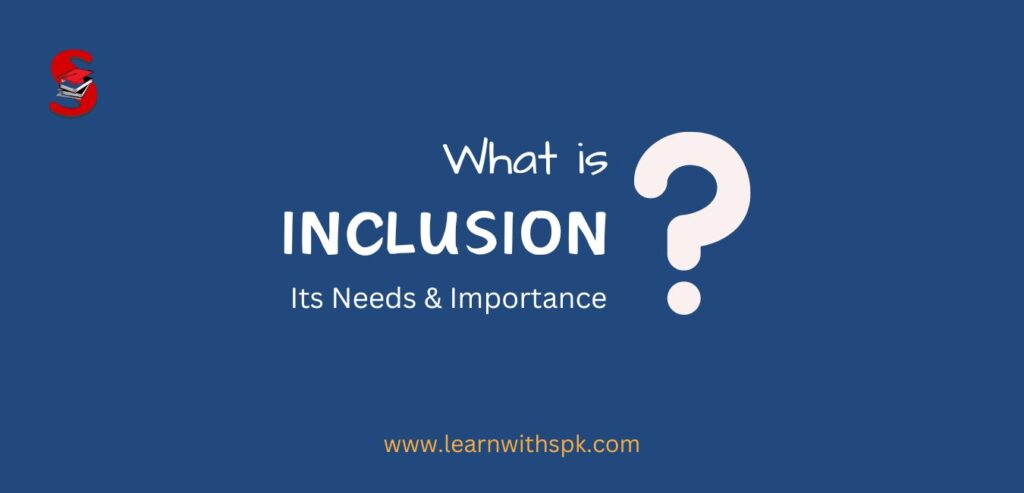What is inclusion in education? What are the need and importance of inclusion in education? In this article, we will discuss the origin, meaning, concept, and definition of inclusion in detail. Also, the various needs and importance of inclusion in education.

What is Inclusion in Education? – Understanding its Origin, Concept, and Definition
Understanding the concept of inclusion is very important in education. Here we will have a detailed discussion on Inclusion in Education. The origin, concept, and definition of inclusion are discussed below.
Origin of Concept of Inclusion:
The concept of inclusion was conceived in 1948 with the declaration adopted by the UN General Assembly on the “International Bill of Rights” which recognizes that all human beings are born free and equal in dignity and rights. You can know more about its types.
Meaning of Inclusion:
Inclusion is the acceptance of all people regardless of their differences. It is about appreciating people for who they are and their competencies, rather than how they walk, talk, or even behave, Inclusion also allows people to value the differences in each other by appreciating that each person is unique in his/her creativity.
Theoretically, inclusion is the creation of an enabling environment that provides for the acceptance of children with and without disabilities to play and interact every day without any prejudices whatsoever, even if these children are receiving therapeutic services.
Inclusion at its simplest is ‘the state of being included’ but it is a bit more complicated than that…. It is used by disability rights activists to promote the idea. that all people should be freely and openly accommodated without restrictions or limitations of any kind.
Definition of Inclusion:
Miller and Katz (2002) defined inclusion as: “a sense of belonging: feeling respected, valued for who you are; feeling a level of supportive energy and commitment from others so that you can do your best.” It is about valuing all individuals, giving equal access and opportunity to all, and removing discrimination and other barriers to involvement.
Inclusion in education is an approach to educating students with special educational needs. Under this model, students with special needs spend most or all of their time with non-disabled students. Inclusion rejects the use of special schools or classrooms to separate students with disabilities from students without disabilities.
Need and Importance of Inclusion in Education
Inclusion in education is a need of the Indian society of today as it intends to bridge the gap between special education, integrated education, and the general system of education. And will reduce exclusion and all types of discrimination prevalent in our education pattern of today.
The need and importance of inclusion are as follows.
#1 Universalization of Education:
Inclusion in education helps in achieving our motive of universalization of education. It could only be possible if the expansion of education is made keeping in view the mental and physical health, needs, and other strengths of the children.
#2 To Fulfil the Constitutional Responsibility:
Inclusive education is an attempt to maintain the principle of equality by giving every child the right to get an education in the school of his choice regardless of his/her differences in physical, psychological, and socio-cultural background.
#3 To Improve the Quality of Education:
One of the basic objectives of inclusion in education is not only “Education for All” but also ‘quality education for all’. It is a very exciting challenge and inclusive education is ready to meet it.
#4 For Achieving Social Equality:
Inclusive education is the field for the realization and achievement of social equality. Only a truly educated individual may realize that all human beings are equal and everyone has an equal right to education to be able to earn a livelihood and support his family.
#5 Development and Empowerment of Society:
A few privileged and educated cannot make society a developed and empowered place. It is the masses who through inclusive education may progress and become powerful to enhance the empowerment of society.
#6 For Development of Healthy Citizenship:
Democracy needs good and responsible citizens. Along with non-disabled children inclusive education takes into consideration disabled children so that they too can become healthy and responsible citizens of India.
#6 Individual Life and Development:
The prime importance of inclusion in education is to enable each child to progress and have a happy life in the future. Inclusive education is significant for the healthy physical, emotional, social, and mental development of children in the following ways –
- Inclusion in education gives children an opportunity to understand the positive traits of others and learn to appreciate them.
- Children learn to help each other in academic and non-academic activities.
- Disabled children get all sorts of help naturally in the permissive atmosphere of the school.
- Schools are important places for children to develop friendships and learn social skills. Children with and without disabilities learn with and from each other in inclusive classes.
- The non-disabled children while interacting with disabled children learn many realities of life.
- In this approach, children help each other in learning, such as peer-tutoring so they take it easy and feel more comfortable.
- Supportive and accommodating services, help children to learn how to maintain emotional equilibrium in distress.
Conclusion:
As disabled children are the main concern in inclusive education, they benefit from adequate educational opportunities; some occupational training, and placement, and hence may rehabilitate well in their personal and social lives.
Many advocates of inclusion believe that special needs children who attend regular classes will be better equipped to handle the world in their teen and adult years. It is due to their exposure to children without special needs. They can develop different skills for better social living.